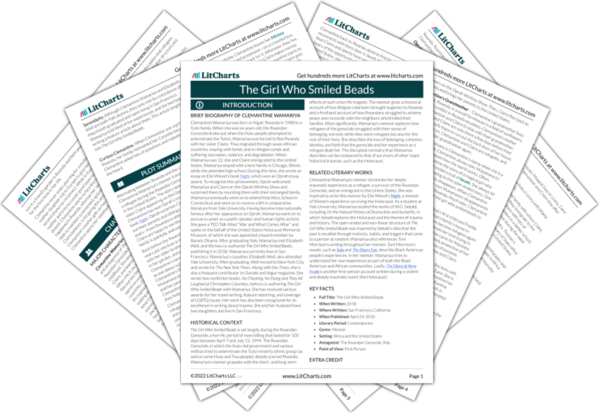As a refugee of the Rwandan Genocide, Clemantine Wamariya—the author of The Girl Who Smiled Beads—longs for a coherent narrative of her own life. When she’s forced to suddenly leave her home in Rwanda and spend the next six years as a refugee, her life ceases to follow a linear path. She tries to combat the loss of time, place, and memories by collecting keepsakes: rocks from each place she and her sister Claire pass through, her favorite articles of clothing, and presents for her brother Pudi. Clemantine keeps these objects in a Mickey Mouse backpack—her one possession—until she disastrously leaves it on a crowded bus. For Clemantine, the loss of this backpack is the loss of her life story. Much later, when she has immigrated to the United States, she continues to collect objects, which she calls her katunda, or “stuff.” From these objects—pictures, ticket stubs, gifts—she hopes she can one day piece together an all-encompassing and logical narrative of her life.
As inspiration, Clemantine returns to a story her nanny Mukamana used to tell her about a girl who wanders the earth and smiles a trail of beads. When Mukamana told this story, she allowed Clemantine to choose the plot. In the present, Clemantine feels that she is the girl who smiles beads: her life, although fragmented, is beautiful. However, despite this justification, Clemantine continues to yearn for a plot and an ending to her story, craving some sort of lens that will unify or—to a certain extent—make sense of everything that has happened to her. In this way, the memoir itself is the product of Wamariya’s attempt to recount her fragmented story. Alternating back and forth between her experience in 1990s Rwanda and her experience in the present-day United States, the book tells a jumbled, wide-reaching story of the refugee experience. Though it remains unclear whether or not writing the memoir gives Wamariya the closure she seeks, the very lack of a conclusive ending illustrates just how hard it is to create a coherent narrative out of deeply traumatic experiences.
Narrative, Memory, and Fragmentation ThemeTracker

Narrative, Memory, and Fragmentation Quotes in The Girl Who Smiled Beads
Often, still, my own life story feels fragmented, like beads unstrung. Each time I scoop up my memories, the assortment is slightly different. I worry, at times, that I’ll always be lost inside. I worry that I’ll be forever confused.

Unlock explanations and citation info for this and every other The Girl Who Smiled Beads quote.
Plus so much more...
Get LitCharts A+My life does not feel logical, sequential, or inevitable. There’s no sense of action, reaction; no consequence, repercussion; no plot. It’s just fragments, floating.
That’s life in a refugee camp: You’re not moving toward anything. You’re just in a horrible groove. You learn skills that you wish you did not know: how to make a fire, how to cook maize, how to do laundry in the river and burn the lice on rocks. You wait, […]
But nothing gets better. There is no path for improvement—no effort you can make, nothing you can do, and nothing anybody else can do either, short of the killers in your country laying down their arms and stopping their war so that you can move home.
The plot provided by the universe was filled with starvation, war, and rape. I would not—could not—live in that tale.
Instead, I would be the girl who smiled beads, my version of the girl who smiled beads, one who had power and agency over her life, one who did not get caught.
I need more than the artifacts stuffed into a suitcase. I need to comprehend my history, a deep history. I know the facts about the genocide […] But that is not enough. The past, that story, cannot fill me. I need a longer, broader, more fully human backstory, a history not all soaked in blood. I need clarity, perspective, joy, beauty, originality, intelligence, a wide-angle view.
I had only a character, a rubric. The girl who smiled beads gave me a way to go through the world […] but I was still looking for a narrative that felt coherent and complete. […] I still, still, after everything […] longed for Mukamana. I wanted her to sit on the side of my bed, talk to me, and make my world feel not just magnificent but logical and whole.











